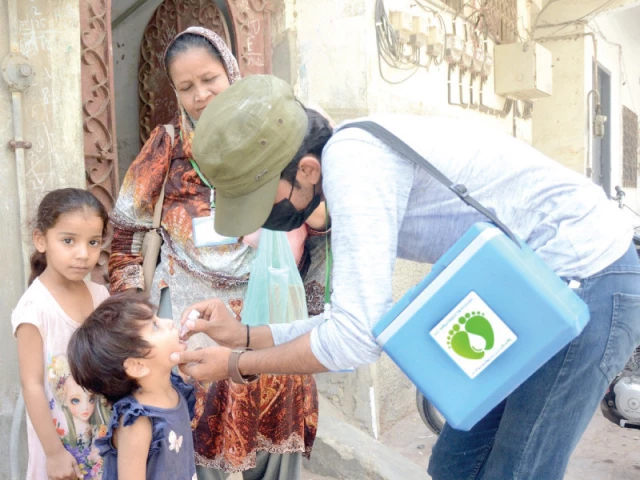The National Polio Eradication Campaign is administering polio vaccines to more than 43.7 million children across Pakistan
A health worker administers anti-polio drops to a child during the launch of the city-wide vaccination campaign, marking another crucial step in the fight to protect future generations from the crippling disease. PHOTO: JALAL QURESHI/EXPRESS
The Regional Reference Laboratory for Polio Eradication of the National Institute of Health (NIH), Islamabad, has confirmed a new case of wild poliovirus in Torghar district, Khyber-Pakhtunkhwa. This is the second case in Torghar district this year.
Wild poliovirus (WPV1) was detected in a 12-month-old boy from Ghari Union Council, Torghar. With this detection, the total number of polio cases in Pakistan in 2025 reached 30, including 19 in Khyber-Pakhtunkhwa, nine in Sindh and one each in Punjab and Gilgit-Baltistan.
The national polio eradication campaign helped reduce polio to more than 43.7 million children across Pakistan in the first six days, according to the National Emergency Operations Center (NEOC).
Read: Polio campaign reaches over 43.7 million children across Pakistan
The Prime Minister’s focal person for polio eradication, Senator Ayesha Raza Farooq, said: “Protecting children from polio is a shared responsibility, and I urge all parents and guardians to open their doors to vaccinators and ensure their children receive the life-saving drops that protect them from a lifelong crippling disease.”
The polio eradication campaign in KP South started on October 20 and will end on October 23.
As of September 2025, Pakistan’s polio program collected 127 wastewater samples from 87 districts across the country through its environmental monitoring network. Of these, 81 tested negative and no poliovirus was detected, while 44 samples tested positive. Two samples are currently being processed in the laboratory.
Of the total samples, Balochistan had 21 negative, 2 positive; Punjab had 22 negative, 8 positive, 1 ongoing; Khyber-Pakhtunkhwa had 24 negatives, 10 positives; Sindh had 7 negative, 21 positive, 1 in progress; Islamabad had 4 negative, 1 positive; Azad Jammu and Kashmir had 3 negatives; and Gilgit-Baltistan had 1 negative and 1 positive result.
Learn more: The fight against polio is not reaching its goal
Although the overall trend indicates a decline in positive detections, reflecting the impact of recent high-quality vaccination campaigns, virus circulation persists in some high-risk areas. These detections highlight the continued need for strong, targeted efforts to interrupt transmission.
This national effort sparked a massive response from all regions. In Punjab, over 23 million children have been vaccinated, while Sindh has protected over 10.4 million. Khyber-Pakhtunkhwa recorded over 6.1 million vaccinations and Balochistan vaccinated over 2.58 million children.
The campaign also extended to federal and regional territories. Islamabad has administered drops to over 466,000 children, Azad Jammu and Kashmir to over 733,000 and Gilgit-Baltistan to around 294,000 children.
The World Health Organization (WHO) has declared the overall performance of the polio campaign satisfactory, noting a significant improvement in coverage of previously missed children.
Thank you Pakistan for reaffirming #EMR72 that the country “stands ready to work with all Member States and WHO to build a climate-resilient, low-carbon and equitable health future for all.” @WHO stands with Pakistan to jointly combat climate-related public health threats. pic.twitter.com/lRfC4cKkP1
– WHO Pakistan (@WHOPakistan) October 17, 2025
Officials reiterated that protecting the nation’s future from polio is a national responsibility. The NEOC highlighted the crucial role of parents and guardians, urging them to ensure that every child under the age of five receives these essential drops.
Also read: Pakistan launches polio campaign targeting 45 million children (NEOC)
Pakistan’s polio eradication program, launched in 1994, has helped reduce the annual number of polio cases by 99.6 percent, from about 20,000 annual cases to 74 in 2024 — and 29 so far this year, NEOC reported.
.@WHO EMRO Regional Committee:
Prime Minister’s Polio Focal Person @AyeshaRaza13 highlighted that Pakistan has reduced polio cases by 99.6% since the 1990s and reminded us that “we have the historic opportunity to make paralytic polio the second disease to be eradicated in the world.” #EMRC72 pic.twitter.com/2ZZ3WN8bbE– WHO Pakistan (@WHOPakistan) October 15, 2025
The Pakistan Polio Eradication Initiative, NEOC and its partners, launched a week-long polio immunization campaign on October 13 to vaccinate more than 45 million children in 159 districts across the country, as part of ongoing efforts to protect all children against paralytic polio.
This year, NEOC mobilized more than 400,000 trained vaccinators for the fourth national polio campaign. Although the campaign ends today in all other parts of the country, it will take place from October 20 to 23 in Khyber-Pakhtunkhwa.
Since last week, @WHOin collaboration with its partners, mobilized more than 400,000 vaccinators to support @GovtofPakistan in the ongoing campaign to protect 45 million children from paralytic polio. These pioneers have played a key role in reducing polio cases by 99.6% since 1994. Together we can #EndPolio pic.twitter.com/1PravmXepx
– WHO Pakistan (@WHOPakistan) October 20, 2025
The campaign came at a critical time when the resurgence of the poliovirus has affected 29 children so far this year. Additionally, recent widespread flooding across Pakistan has disrupted sanitation systems, displaced families and hampered health services for affected populations, increasing the risk of poliovirus transmission due to stagnant water and population displacement.
Polio is a highly contagious and incurable disease that can cause permanent paralysis. The only effective protection is repeated doses of oral polio vaccine (OPV) to every child under five years of age during each vaccination campaign, as well as timely completion of all routine immunizations.




